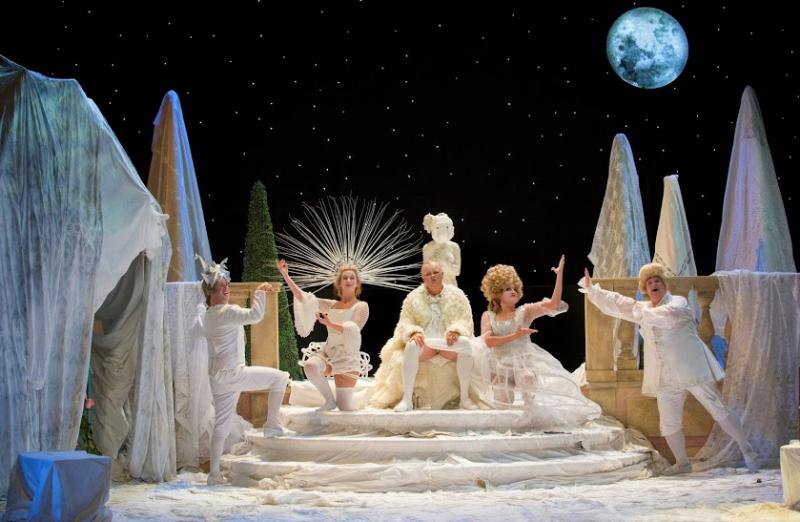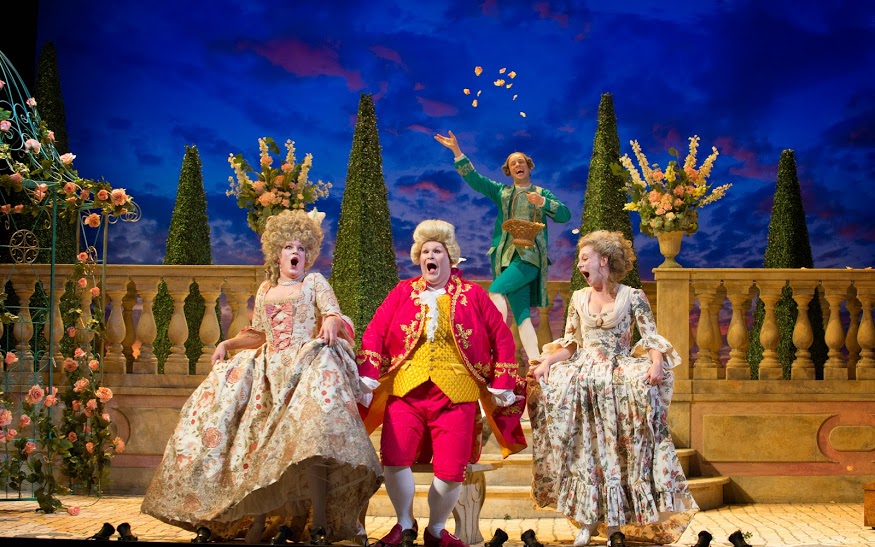Life on the Moon, English Touring Opera | reviews, news & interviews
Life on the Moon, English Touring Opera
Life on the Moon, English Touring Opera
Costumes, conductor and star tenor keep this mundane Haydn opera afloat

You may be more familiar with the Italian title, Il mondo della luna, but chances are you won’t have seen this or any of Haydn’s other 16 operas. You haven’t missed much, at least until the last of his works as court composer to the Esterházy family, Armida, an "heroic drama" rather than the slim comedies which don’t seem to have inspired the composer to the heights of his symphonies and string quartets.
Should English Touring Opera have bothered with Life on the Moon, which started out last night with one performance only at the Hackney Empire? Everyone tries hard, sometimes too hard in the would-be knockabout staging of Cal McCrystal, “Physical Comedy Director” of the irrepressible One Man, Two Guvnors. It wasn’t a bad idea to get him to work on another piece originating in a Goldoni plot – the Venetian comic master’s libretto already had several settings by the time Haydn got hold of it in 1777 – but few singers are born to master disciplined slapstick. With the exception of a laugh-out-loud routine as Ronan Busfield’s servant Cecco keeps on dropping a telescope leg every time he tries to pick another up, repetition palls.
 A lot of fleshing out is needed for a slender plot in which a miserly widower, turned into a sexist old lech in ETO General Director James Conway’s translation, finds himself gulled by a quack astronomer into believing that there’s a better life, including hot running girls 40 years his junior, on the moon. Conway, whose rhyming couplets for the recitative are better and funnier than the sometimes ungainly word-setting of the arias and ensembles, has pared away a second miser’s daughter and her boyfriend, but McCrystal doesn’t seem inclined to take the principal lovers seriously. Soprano Jane Harrington has to wearily upstage her own bravura as Clarice, while Martha Jones as her father’s maid Lisetta (pictured above on the right with Harrington, Christopher Turner and Busfield) – though she gets some nice tripping 6/8 passages – struggles to take on the role, and the interminable aria, of Lunar Empress.
A lot of fleshing out is needed for a slender plot in which a miserly widower, turned into a sexist old lech in ETO General Director James Conway’s translation, finds himself gulled by a quack astronomer into believing that there’s a better life, including hot running girls 40 years his junior, on the moon. Conway, whose rhyming couplets for the recitative are better and funnier than the sometimes ungainly word-setting of the arias and ensembles, has pared away a second miser’s daughter and her boyfriend, but McCrystal doesn’t seem inclined to take the principal lovers seriously. Soprano Jane Harrington has to wearily upstage her own bravura as Clarice, while Martha Jones as her father’s maid Lisetta (pictured above on the right with Harrington, Christopher Turner and Busfield) – though she gets some nice tripping 6/8 passages – struggles to take on the role, and the interminable aria, of Lunar Empress.
The men fare better. Stalwart bass Andrew Slater rolls out a frog-footman comic turn as old bore Buonafede, presumably meant to be deliberately unpleasant beyond opera buffa bounds at times, and Busfield flashes a nice set of teeth in the constant upstaging with which McCrystal entrusts him; but the most stylish of the bunch is Christopher Turner as Ecclitico (eclipse, get it?), whose lyric-tenor phrasing gives his first big aria more grace than its typically generic material really deserves.
He’s part of a triumvirate which really saves the evening. Harpsichordist turned conductor Christopher Bucknall, a pillar of the period-instrument scene, injects life into every line from the spirited Old Street Band, with horns especially fine in thrusting home the minor-key anger of duped Buonafede in the act two finale. And designer takis (sic) complements rather ravishing 18th-century silks in the first act with lunatic caprices on their styles and wacky hats as the formal garden is transfigured into an all-white moon. So time passes not unpleasantly, and certainly less tediously than in Glyndebourne’s production of Mozart’s La finta giardiniera – composed two years before Il mondo della luna, when Mozart was 19 and Haydn 43. That staging is also set for a UK tour.
Life on the Moon may not have the Counterfeit Garden-Girl’s sudden depths, but it’s never less than a professional job on Haydn’s part. You just won’t come out humming any of the tunes.
rating
Explore topics
Share this article
Add comment
The future of Arts Journalism
You can stop theartsdesk.com closing!
We urgently need financing to survive. Our fundraising drive has thus far raised £49,000 but we need to reach £100,000 or we will be forced to close. Please contribute here: https://gofund.me/c3f6033d
And if you can forward this information to anyone who might assist, we’d be grateful.

Subscribe to theartsdesk.com
Thank you for continuing to read our work on theartsdesk.com. For unlimited access to every article in its entirety, including our archive of more than 15,000 pieces, we're asking for £5 per month or £40 per year. We feel it's a very good deal, and hope you do too.
To take a subscription now simply click here.
And if you're looking for that extra gift for a friend or family member, why not treat them to a theartsdesk.com gift subscription?
more Opera
 BBC Proms: The Marriage of Figaro, Glyndebourne Festival review - merriment and menace
Strong Proms transfer for a robust and affecting show
BBC Proms: The Marriage of Figaro, Glyndebourne Festival review - merriment and menace
Strong Proms transfer for a robust and affecting show
 BBC Proms: Suor Angelica, LSO, Pappano review - earthly passion, heavenly grief
A Sister to remember blesses Puccini's convent tragedy
BBC Proms: Suor Angelica, LSO, Pappano review - earthly passion, heavenly grief
A Sister to remember blesses Puccini's convent tragedy
 Orpheus and Eurydice, Opera Queensland/SCO, Edinburgh International Festival 2025 review - dazzling, but distracting
Eye-popping acrobatics don’t always assist in Gluck’s quest for operatic truth
Orpheus and Eurydice, Opera Queensland/SCO, Edinburgh International Festival 2025 review - dazzling, but distracting
Eye-popping acrobatics don’t always assist in Gluck’s quest for operatic truth
 MARS, Irish National Opera review - silly space oddity with fun stretches
Cast, orchestra and production give Jennifer Walshe’s bold collage their all
MARS, Irish National Opera review - silly space oddity with fun stretches
Cast, orchestra and production give Jennifer Walshe’s bold collage their all
 Káťa Kabanová, Glyndebourne review - emotional concentration in a salle modulable
Janáček superbly done through or in spite of the symbolism
Káťa Kabanová, Glyndebourne review - emotional concentration in a salle modulable
Janáček superbly done through or in spite of the symbolism
 Buxton International Festival 2025 review - a lavish offering of smaller-scale work
Allison Cook stands out in a fascinating integrated double bill of Bernstein and Poulenc
Buxton International Festival 2025 review - a lavish offering of smaller-scale work
Allison Cook stands out in a fascinating integrated double bill of Bernstein and Poulenc
 Tosca, Clonter Opera review - beauty and integrity in miniature
Happy surprises and a convincing interpretation of Puccini for today
Tosca, Clonter Opera review - beauty and integrity in miniature
Happy surprises and a convincing interpretation of Puccini for today
 Hamlet, Buxton International Festival review - how to re-imagine re-imagined Shakespeare
Music comes first in very 19th century, very Romantic, very French operatic creation
Hamlet, Buxton International Festival review - how to re-imagine re-imagined Shakespeare
Music comes first in very 19th century, very Romantic, very French operatic creation
 Falstaff, Glyndebourne review - knockabout and nostalgia in postwar Windsor
A fat knight to remember, and snappy stagecraft, overcome some tedious waits
Falstaff, Glyndebourne review - knockabout and nostalgia in postwar Windsor
A fat knight to remember, and snappy stagecraft, overcome some tedious waits
 Salome, LSO, Pappano, Barbican review - a partnership in a million
Asmik Grigorian is vocal perfection in league with a great conductor and orchestra
Salome, LSO, Pappano, Barbican review - a partnership in a million
Asmik Grigorian is vocal perfection in league with a great conductor and orchestra
 Semele, Royal Opera review - unholy smoke
Style comes and goes in a justifiably dark treatment of Handelian myth
Semele, Royal Opera review - unholy smoke
Style comes and goes in a justifiably dark treatment of Handelian myth
 Le nozze di Figaro, Glyndebourne review - perceptive humanity in period setting
Mostly glorious cast, sharp ideas, fussy conducting
Le nozze di Figaro, Glyndebourne review - perceptive humanity in period setting
Mostly glorious cast, sharp ideas, fussy conducting

Comments
I've been waiting for a
Well, Roger, it's certainly
Well, Roger, it's certainly not bad. The real question is, are this and any of the other Haydn operas really worth staging? And yes, I saw a performance of La fedelta premiata in the 1980 revival run. How frustrating it was to see Rosenkavalier as the star show of the year from Erte's design on the programme cover. Still, I enjoyed it.